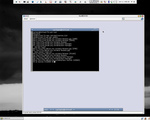RISC OS is 35 but it's still kicking


RISC OS, the operating system of the original Arm computer, the Acorn Archimedes, is still very much alive – and doing relatively well for its age.
In June 1987, Acorn launched the Archimedes A305 and A310, starting at £800 ($982) and running a new operating system called Arthur. At the time, it was a radical and very fast computer. In his review [PDF] for Personal Computer World, Dick Pountain memorably said: "It loads huge programs with a faint burping noise, in the time it takes to blink an eye."
Arthur was loosely related to Acorn's earlier MOS, the BBC Micro operating system but looked very different thanks to a prototype graphical desktop, implemented in BBC BASIC, that could charitably be called "technicolor."
Renamed RISC OS, version 2 followed in 1989 – the same year that Sun started selling its new SPARCstation 1 (a snip at £7,500c $9,200) and DEC launched the MIPS R2000-chipset-based DECstation 3100 (for £8,800/c $10,800).
RISC OS has had a rather convoluted history, partly due to Acorn spinning out Arm, eventually pulling out of the computer market, rebranding as Element 14 and being acquired by Broadcom, where Arm co-designer Sophie Wilson still works today. And partly due to drama over the ownership of the OS post-Acorn at one point.
-

- Login or register to post comments
 Printer-friendly version
Printer-friendly version- 3438 reads
 PDF version
PDF version
More in Tux Machines
- Highlights
- Front Page
- Latest Headlines
- Archive
- Recent comments
- All-Time Popular Stories
- Hot Topics
- New Members
digiKam 7.7.0 is released
After three months of active maintenance and another bug triage, the digiKam team is proud to present version 7.7.0 of its open source digital photo manager. See below the list of most important features coming with this release.
|
Dilution and Misuse of the "Linux" Brand
|
Samsung, Red Hat to Work on Linux Drivers for Future Tech
The metaverse is expected to uproot system design as we know it, and Samsung is one of many hardware vendors re-imagining data center infrastructure in preparation for a parallel 3D world.
Samsung is working on new memory technologies that provide faster bandwidth inside hardware for data to travel between CPUs, storage and other computing resources. The company also announced it was partnering with Red Hat to ensure these technologies have Linux compatibility.
|
today's howtos
|









.svg_.png)
 Content (where original) is available under CC-BY-SA, copyrighted by original author/s.
Content (where original) is available under CC-BY-SA, copyrighted by original author/s.

Recent comments
1 year 11 weeks ago
1 year 11 weeks ago
1 year 11 weeks ago
1 year 11 weeks ago
1 year 11 weeks ago
1 year 11 weeks ago
1 year 11 weeks ago
1 year 11 weeks ago
1 year 11 weeks ago
1 year 11 weeks ago